

Hanban-News. [Source] Confucius Institute at UNZA [Time] 2012-06-08 07:52:48 The first two Chinese volunteer Teachers of Confucius Institute at UNZA arrived in Lusaka, the capital of Zambia, on May 30.
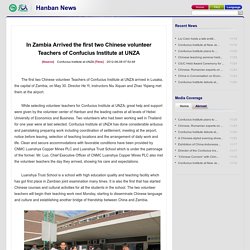
Director He Yi, instructors Niu Xiquan and Zhao Yiqiang met them at the airport. While selecting volunteer teachers for Confucius Institute at UNZA, great help and support were given by the volunteer center of Hanban and the leading cadres at all levels of Hebei University of Economics and Business. Zambian slang. Like many other countries or cultures Zambia contains a mixture of euphemisms in various provinces or different parts of Towns/Areas/Regions that often leave Zambians from various backgrounds/foreigners scratching their heads wondering the meanings of the catch phrases or terminologies.While most of the words are used in English,some of the words are also commonly used in the local languages such as Nyanja and Bemba which are widely spoken throughout some or most parts of Zambia.The following are terms/words/Phrases commonly used in Lusaka, Copperbelt province and some parts of Zambia.
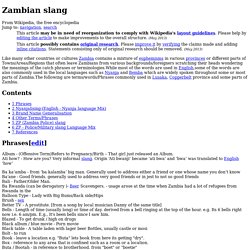
Phrases[edit] Album - (Offensive Term)Refers to Pregnancy/Birth – That girl just released an Album.Ati how? Zambia. This article is about the African nation.
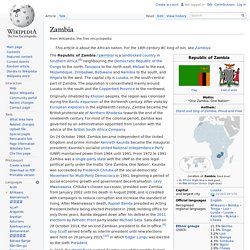
For the 18th-century BC king of Isin, see Zambiya. The Republic of Zambia /ˈzæmbiə/ is a landlocked country in Southern Africa,[8] neighbouring the Democratic Republic of the Congo to the north, Tanzania to the north-east, Malawi to the east, Mozambique, Zimbabwe, Botswana and Namibia to the south, and Angola to the west.
The capital city is Lusaka, in the south-central part of Zambia. The population is concentrated mainly around Lusaka in the south and the Copperbelt Province to the northwest. Zambia. Zambia /ˈzæmbiə/, officially the Republic of Zambia, is a landlocked country in Southern Africa.[7] The neighbouring countries are the Democratic Republic of the Congo to the north, Tanzania to the north-east, Malawi to the east, Mozambique, Zimbabwe, Botswana and Namibia to the south, and Angola to the west.
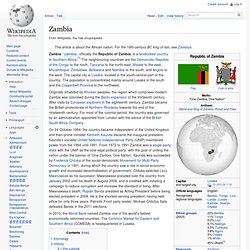
The capital city is Lusaka, located in the south-central part of the country. The population is concentrated mainly around Lusaka in the south and the Copperbelt Province to the northwest. Originally inhabited by Khoisan peoples, the region which comprises modern Zambia was colonised during the Bantu expansion of the thirteenth century. Tumbuka language. The Tumbuka language is a Bantu language which is spoken in parts of Malawi, Zambia, and Tanzania.
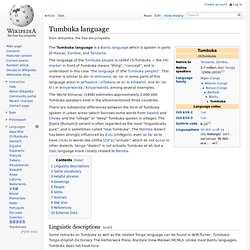
The World Almanac (1998) estimates approximately 2,000,000 Tumbuka speakers exist in the aforementioned three countries. There are substantial differences between the form of Tumbuka spoken in urban areas (which borrows some words from Swahili and Chewa and the "village" or "deep" Tumbuka spoken in villages.
The [kyela [Rumphi]] variant is often regarded as the most "linguistically pure", and is sometimes called "real Tumbuka". Bemba language. The Bemba language, ChiBemba (also Cibemba, Ichibemba, Icibemba and Chiwemba), is a major Bantu language spoken primarily in north-eastern Zambia by the Bemba people and as a lingua franca by about 18 related ethnic groups, including the Bisa people of Mpika and Lake Bangweulu, and to a lesser extent in Katanga in the Democratic Republic of the Congo, Tanzania, and Botswana.
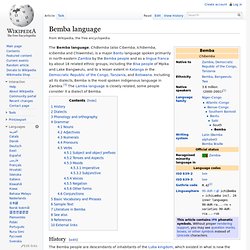
Including all its dialects, Bemba is the most spoken indigenous language in Zambia.[3] The Lamba language is closely related, some people consider it a dialect of Bemba. History[edit] History of Zambia. This article deals with the history of the country now called Zambia from prehistoric times to the present.
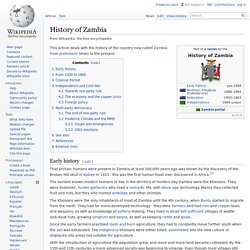
Early history[edit] That archaic humans were present in Zambia at least 200,000 years ago was shown by the discovery of the Broken Hill skull in Kabwe in 1921 - this was the first human fossil ever discovered in Africa.[1] The earliest known modern humans to live in the territory of modern day Zambia were the Khoisans.
They were bushmen, hunter-gatherers who lived a nomadic life, with stone age technology. Homo rhodesiensis. Homo rhodesiensis is now regarded by some scientists as another name for Homo heidelbergensis.[1][2][3] Discovery[edit] Kabwe 1, also called the Broken Hill skull, was assigned by Arthur Smith Woodward in 1921 as the type specimen for Homo rhodesiensis; today most scientists now assign it to Homo heidelbergensis.[1][4] The cranium was found in a lead and zinc mine in Broken Hill, Northern Rhodesia (now Kabwe, Zambia) in 1921 by Tom Zwiglaar, a Swiss miner.
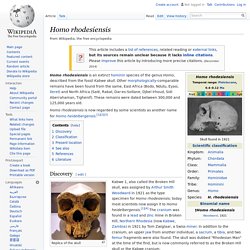
In addition to the cranium, an upper jaw from another individual, a sacrum, a tibia, and two femur fragments were also found. The skull was dubbed "Rhodesian Man" at the time of the find, but is now commonly referred to as the Broken Hill skull or the Kabwe cranium. Steatopygia. A Khoisan woman displaying steatopygia Steatopygia (/stiːˌætɵˈpɪdʒiə/;[1] from the Greek στέαρ stéar, "tallow" and πυγή pugḗ, "rump") is the state of having substantial levels of tissue on the buttocks and thighs.
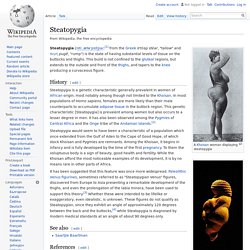
This build is not confined to the gluteal regions, but extends to the outside and front of the thighs, and tapers to the knee producing a curvaceous figure. History[edit] Steatopygia is a genetic characteristic generally prevalent in women of African origin, most notably among though not limited to the Khoisan. Bemba people. The Bemba (or 'BaBemba' using the Ba- prefix to mean 'people of', and also called 'Awemba' or 'BaWemba' in the past) belong to a large group of Bantu peoples mainly in the Northern, Luapula and Copperbelt Provinces of Zambia who trace their origins to the Luba and Lunda states of the upper Congo basin, in what became Katanga Province in southern Congo-Kinshasa (DRC).
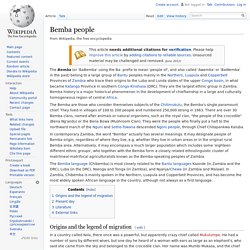
They are the largest ethnic group in Zambia. Bemba history is a major historical phenomenon in the development of chieftainship in a large and culturally homogeneous region of central Africa. The Bemba are those who consider themselves subjects of the Chitimukulu, the Bemba's single paramount chief.